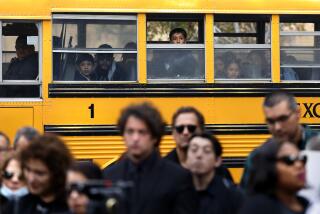Counterculture Heirs Are Not So Far Out : Sociology: Children of hippies, commune-dwellers better than average in school but fairly conventional, study finds.
- Share via
Depending on which side of the tie-dyed curtain predictors stood, babies born to countercultural parents in the 1970s were believed to have one of two futures: They were either going to be a new species of enlightened, extravagantly gifted youngsters or they were destined to be psychologically warped, without any chance to succeed in society.
According to a new UCLA study, both sides were wrong.
Perhaps to the surprise and relief of more conservative grandparents, the offspring of hippies, commune-dwellers, strong feminists and others who held countercultural values generally performed better than average in school, researchers say. Perhaps to their parents’ disappointment, countercultural children behaved fairly conventionally, even though they were more aware than other children of such issues as women’s rights and ecology.
“Although there was great concern at the time of their births, there is no evidence that these children are not turning out as well or better than the population at large,” said UCLA anthropology professor Thomas S. Weisner, director of the Family Lifestyles Project. “In that sense, the nonconventional lifestyle is vindicated.”
In 1974, Weisner and colleagues climbed Northern California hills looking for pregnant women in communes and screened urban health clinics statewide for countercultural mothers-to-be. The result was a study group of 203 Anglo children born to single mothers, unmarried couples, or parents living in communal situations. In addition, the parents all professed what were considered countercultural values at that time, such as sexual egalitarianism, non-materialism, environmentalism and a suspicion of authority, Weisner said.
Tracked until they entered junior high school at about age 12, the countercultural children produced school records that put 86% of them above median grades and test scores. For example, they averaged B-plus grades in reading, compared to Bs for a control group of 50 children of married parents with “straight” values, the study says. Their IQ test scores averaged 113, which was not significantly different from the 114 average score in the control group, but somewhat higher than the national norm of 100 points.
On the downside, countercultural families showed a higher incidence of social and emotional problems, UCLA’s project found. About 17% of those families grappled with such problems as substance abuse or instability, compared to about 10% for the general population, Weisner said. But that is not shocking because the counterculture attracted some troubled people who really had little commitment to its ideals, Weisner said.
More significant, he said, is that most countercultural families taught strong values to their children, no matter how varied those values or how much they differed from the larger society’s. From that, Weisner drew a lesson for all parents:
“Take a broad view. Don’t be obsessed if your kids play with guns or not, if the husband or wife washes the dishes equally, if boys want blue clothes and girls want dolls,” Weisner said. “These kinds of things do not affect children nearly as much as some parents fear.
“It is more important to show children your sense of family commitment, to offer moral guidance and to show children that there can be more than one way to view the world,” he said, adding that he has been married to the same woman for 23 years and would describe himself as a conventional husband and father.
Even drug use by the parents appears to have had no influence on the children’s later success, although the study did find that most of the mothers limited or stopped using drugs during pregnancy to avoid harming the babies.
To be sure, many of the countercultural families in the study became more conventional in appearance and lifestyle as time passed, but, the study found, most of the parents held on to their ideals. Their children, while showing generally mainstream behavior, also believed in sex egalitarianism and environmentalism more than their friends from conventional families, according to the UCLA project.
Weisner, who co-founded the project with the late UCLA psychiatry professor Bernice Eiduson, recently presented the findings to a meeting of the Society for Psychological Anthropology in Chicago.
Weisner and his colleagues are hoping to obtain funding for a complete follow-up on the offspring, who are now about 17 years old. The study would examine in particular sexuality and feelings of self-worth.
“The great struggles of adolescence are sexuality and competency,” Weisner explained. “Perhaps there will be some sleeper effects or latent effects.”
More to Read
Sign up for Essential California
The most important California stories and recommendations in your inbox every morning.
You may occasionally receive promotional content from the Los Angeles Times.














